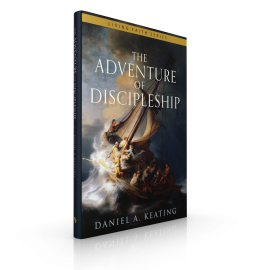By Daniel A. Keating
Daniel Keating is Professor of Theology at Sacred Heart Major Seminary in Detroit, Michigan, where he teaches on Scripture, the Church Fathers, Ecumenism, and the New Evangelization. He is the author of The Adventure of Discipleship.

The core meaning of faith is belief in God and all that he has revealed: “Faith is the theological virtue by which we believe in God and believe all that he has said and revealed to us, and that Holy Church proposes for our belief, because he is truth itself ” (CCC 1814). But faith also includes the full commitment of our lives, what the Catechism calls the commitment of our entire selves to God (1814). The implication is that true faith, as it grows and matures in us, cannot remain simply within our minds as a belief or conviction; it manifests itself in personal commitment as we entrust ourselves completely to God. “Faith is first of all a personal adherence of man to God. . . . It is right and just to entrust oneself wholly to God and to believe absolutely what he says” (150). Or as the Catechism says elsewhere, “To believe is to say ‘Amen’ to God’s words, promises and commandments; to entrust oneself completely to him who is the ‘Amen’ of infinite love and perfect faithfulness” (1064).
This is just how the book of Hebrews illustrates what faith is. After defining faith as “the substance of things hoped for, the evidence of things not seen” (Heb 11:1), Hebrews illustrates what faith is by showing faith in action. “By faith,” Abel, Enoch, Noah, Abraham, Moses, and many others acted upon God’s word. They “lived by faith” and did not shrink back from acting upon the word of God that came to each of them. This is the kind of faith we need in order to embrace the costly adventure of discipleship: a faith that believes God and his word, that enables us to commit ourselves completely to God, and that empowers us to act freely upon God’s word. This is venturesome faith.
In a sermon given in 1836, John Henry Newman speaks forcefully about the “ventures of faith” that are required of the Christian. He begins the sermon by establishing the need for making such ventures: “Here then a great lesson is impressed upon us, that our duty as Christians lies in this, in making ventures for eternal life without the absolute certainty of success.”
Ranging across the Scriptures, Newman shows how these ventures of faith are expressed throughout the history of God’s people: from Abraham to the Apostles and in the Letter to the Hebrews. As a contrast, he points to the failure of the rich young man of the Gospel to make a venture of faith: he walked away sad because he lacked the faith needed to respond to Christ’s invitation.
Newman does not refer to the parable of the talents in the Gospel of Matthew (25:14–30), but it illustrates his point with clarity. Three servants are each given a set of resources of varying amounts. The first and second trade with what they received and bring a return to their master. The third, afraid to lose what he had, buries his talent and returns it with no interest, with nothing gained. Jesus denounces the third servant for being wicked and slothful—he gave way to fear and did not “venture” to invest the resources he was given. This can appear as a harsh handling of the fearful servant, but Christ offers the parable to show how important it is that we act upon the faith we have received and bring a return to the Lord. For Newman, “If then faith be the essence of a Christian life . . . it follows that our duty lies in risking upon Christ’s word what we have, for what we have not.”
There is nothing safe, secure, or predictable about the kind of faith Newman describes here. On the one hand, this active, venturing faith is noble and generous: it is not fearful or constrained. On the other hand, it should not be equated with being rash or frivolous. It is grounded in the faithfulness and providence of God.
At this point it is crucial to distinguish a venturesome faith from its imposters and counterfeits. Some people have a natural disposition to be adventurous; they become easily bored with routine and like to take risks. Often they push themselves to extremes, risking health and life in the pursuit of danger or new experiences. This is not the venturesome faith Newman is pointing to. Other people are naturally cautious; they weigh things carefully and rarely take steps that are genuinely risky. They are risk-averse. Natural dispositions of both kinds can be of great service to us or can become a significant hindrance, but they should not be confused with godly virtue. The virtuous person is one who knows when to take a risk and when to step back in caution. Whether we are naturally risk-takers or naturally risk-averse, we are all called to invest our lives in the kingdom of God with a venturesome faith.
We can risk our lives because of the light and certainty that our faith gives us. By faith we trust in Christ absolutely, rely upon his word, and can risk our lives on the strength of his word. By faith we also know that God watches over our lives and that he will work all things to the good for those who love him. We do not know, as Newman reminds us, how the details of our lives will work out. We set out on a course and put our whole lives at Christ’s service, and we trust him to lead us to a good end. As is true with any good story or adventure, we as the characters in the story cannot see what will happen in the pages ahead. We have to take things step by step, page by page, trusting in God and following the path laid out before us. It is our faith, in combination with hope and love, that enables us to venture our lives with confidence in God.
You Might Also Like
 Jesus tells us that to be his disciple we must surrender everything and, with his grace, brave the path provided for us by God. Such a sojourn will surely be marked by joy, suffering, uncertainty, and—above all—adventure. In The Adventure of Discipleship, discover the incredible story that is friendship with Christ.
Jesus tells us that to be his disciple we must surrender everything and, with his grace, brave the path provided for us by God. Such a sojourn will surely be marked by joy, suffering, uncertainty, and—above all—adventure. In The Adventure of Discipleship, discover the incredible story that is friendship with Christ.